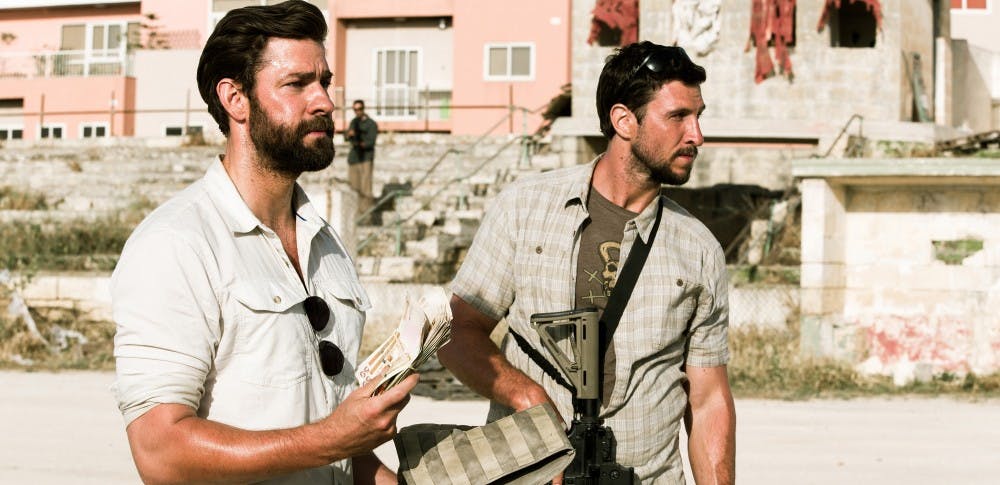At one point during “13 Hours: The Secret Soldiers of Benghazi,” I had a flashback to an episode of “The Office.”
Fans of the show will remember Jim Halpert’s breathtaking performance as Goldenface in Michael Scott’s film “Threat Level Midnight.”
So when John Krasinski aimed a gun at the face of a Libyan militant, I just couldn’t help it: I chuckled.
I hoped it would be the only part of the movie I couldn’t take seriously.
OK, that’s harsh, considering I actually enjoyed it. Let me explain.
“13 Hours: The Secret Soldiers of Benghazi” tells the story of the CIA contractor team who defended United States Ambassador Christopher Stevens’ compound in Benghazi, Libya, during the Sept. 11, 2012 attack. They then held control of a secret CIA outpost nearby for 13 hours while under attack.
Though Krasinski earns top billing, it’s less about his character, Jack Silva, and more about the team.
Simply put, the film excels in a lot of areas.
It quickly builds to Sept. 10 through 11 and doesn’t get bogged down by context. Pacing is key in keeping the audience hooked for the entirety of the film’s 2.5 hours.
It also subtly manages to hit on a lot of big themes, including post-traumatic stress disorder, and avoids getting wrapped up in Islamophobia.
In many of his interviews, Krasinski has said “13 Hours” isn’t a political film. It’s just a movie about six guys who risked their lives, even though they didn’t have to.
Why, then, are the contractors constantly bickering with the CIA agents, claiming they “don’t have any fucking support” long before the attack?
Establishing this friction between these contractors and any other extensions of the U.S. government is heavily symbolic of the widespread criticism of the U.S. government’s response to the attack.
Perhaps most importantly, the film doesn’t dehumanize Muslims, unlike last year’s “American Sniper.”
After spending the entire film focusing on Americans, as the sun rises after the assault, we see the reactions of Libyan women and children sobbing over the dead.
We focus on the face of the supposed leader of the assault who stands staring at the bodies, shaking his head.
Americans are not the only ones dying in these conflicts. Both sides are fighting for something they believe in. It was a poignant moment.
Of course, it’s not perfect. There were several moments, all near the end of the film, that made me roll my eyes.
It’s a Michael Bay film, so we’re basically trained to expect large explosions and be impressed by special effects.
But there was this one slow-motion shot in which a mortar shell fell toward the roof of one of the buildings within the complex, and I’ll be damned if someone didn’t run toward it, shouting something that sounded vaguely like “NOOOOOO.”
I could have done without that.
There were a few sweeping, Bay-esque shots that reminded me vaguely of the “Transformer” movies. The writing left a little to be desired in some places. “They’re all bad guys until they’re not.” What?
At the end of its opening weekend, I’ve seen the word “flop” appear in at least one headline.
I can understand why people aren’t clamoring to see it: it’s a film about one of the most polarizing political buzzwords during a time in which American political discourse is even more polarized.
Also — and I don’t know if you’ve heard — “Star Wars” is still kind of a big deal.
But it does give us just enough shirtless Krasinski to let us objectify him without distracting from the overall plot.
Maybe I’m getting caught up in the small stuff. But if it weren’t for those damn clichés, it would be a solid movie.
@hollyvhays




